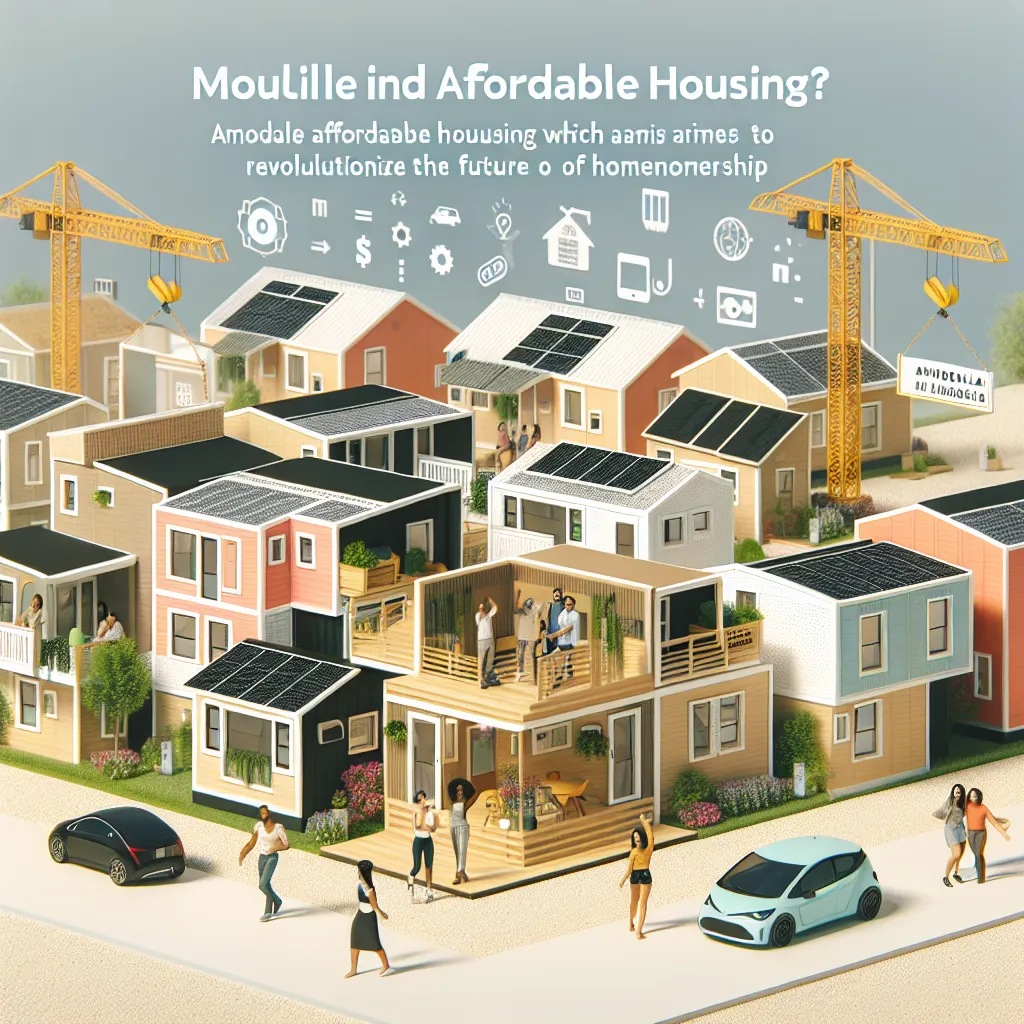Modular Affordable Housing: Revolutionizing the Future of Homeownership
Modular Affordable Housing: Revolutionizing the Future of Homeownership
As housing costs continue to rise, the dream of owning a home becomes increasingly out of reach for many individuals and families. However, a new solution is emerging – modular affordable housing. Combining innovation, efficiency, and affordability, modular housing has the potential to revolutionize the way we think about homeownership.
Understanding Modular Affordable Housing
Modular housing, also known as prefabricated or factory-built housing, involves constructing homes in a factory setting and then transporting them to the desired location for installation. Unlike traditional stick-built homes, which are built on-site, modular homes are constructed in sections or modules that are then assembled at the final destination.
Modular housing offers several advantages over traditional construction methods. First and foremost, it is significantly more cost-effective. By utilizing factory production techniques, economies of scale can be achieved, leading to reduced construction costs. Additionally, the controlled factory environment minimizes the risks of weather delays and allows for better quality control.
The Affordability Factor
One of the primary benefits of modular housing is its affordability. With the rising costs of land, labor, and building materials, traditional construction has become increasingly expensive. Modular homes, on the other hand, offer a more affordable alternative.
Modular housing companies can take advantage of bulk purchasing and streamlined production processes to keep costs down. This cost efficiency translates into more affordable homes for buyers. In fact, studies have shown that modular homes can be up to 20% cheaper than their site-built counterparts.
In addition to the initial purchase price, modular housing can also lead to long-term cost savings. These homes are designed with energy efficiency in mind, utilizing sustainable building materials and incorporating energy-saving features. This results in lower utility bills and reduced environmental impact.
Flexibility and Customization
Contrary to popular belief, modular housing offers a high degree of flexibility and customization. While the basic structure is built using standardized modules, homeowners have the freedom to choose from a wide range of design options and finishes to suit their preferences.
Modular homes can be tailored to meet individual needs, whether it’s a small starter home or a spacious family residence. The modular construction process allows for easy expansion or modification in the future, providing homeowners with the flexibility to adapt their homes as their needs change over time.
Shorter Construction Time
One of the most significant advantages of modular housing is the reduced construction time. Since the modules are pre-fabricated in a factory, the building process can be completed simultaneously with site preparation, leading to faster overall construction.

Modular homes can be constructed in a matter of weeks, as opposed to months or even years for traditional homes. This time-saving factor can be especially beneficial for those who need a home quickly, such as individuals displaced by natural disasters or those facing urgent housing needs.
Quality and Durability
Modular homes are built to meet the same building codes and standards as traditional homes. In fact, due to the controlled factory environment, they often exceed these requirements. The precision and quality control measures employed during the manufacturing process ensure that the final product is of high quality and durability.
Additionally, modular homes are designed to withstand transportation and installation, making them structurally sound and resistant to damage. This focus on quality and durability ensures that homeowners can enjoy their homes for many years to come.
Modular Affordable Housing Initiatives
Recognizing the potential of modular housing to address the affordable housing crisis, many governments, organizations, and developers are embracing this innovative solution.
In some regions, governments are actively promoting the use of modular construction to increase the supply of affordable housing. By providing incentives and streamlining regulations, they are encouraging developers to invest in modular projects that cater to different income levels.
Non-profit organizations are also leveraging modular housing to provide affordable options for low-income individuals and families. These initiatives aim to create sustainable communities that promote social inclusion and help alleviate the housing affordability crisis.
The Future of Homeownership
The modular affordable housing movement is gaining momentum, and its impact on the future of homeownership cannot be underestimated. By providing cost-effective, customizable, and efficient alternatives to traditional construction, modular housing has the potential to reshape the housing market.
As technology advances and innovative design solutions emerge, modular homes will continue to evolve, offering even greater benefits to homeowners. With increased awareness and support, the dream of owning an affordable home can become a reality for more individuals and families.
Conclusion
Modular affordable housing represents a promising solution to the pressing issue of housing affordability. By revolutionizing the construction process, these homes offer a more accessible path to homeownership. With their affordability, flexibility, and shorter construction time, modular homes are changing the way we think about housing, making the dream of owning a home a possibility for a wider range of individuals and families.
